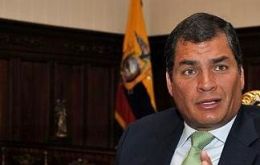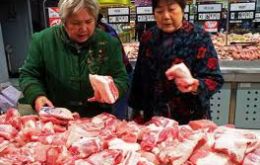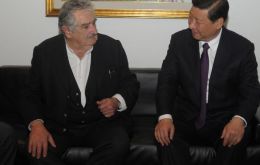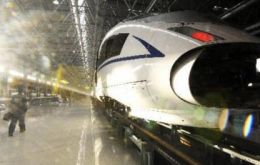MercoPress. South Atlantic News Agency
Tag: China
-
Friday, June 24th 2011 - 18:33 UTC
China readies its first carrier, “a symbol of a great nation”

Chinese military officials have confirmed that the country is completing work on its first aircraft carrier, based on the hull of Russian carrier Varyag.
-
Tuesday, June 21st 2011 - 02:24 UTC
“With a few drops of its reveres, China can finance Ecuador’s development”

Ecuadorian president Rafael Correa said China has one of the largest liquid international reserves in the world and could with “a few drops” finance the development of his country and the whole of Latin America.
-
Friday, June 17th 2011 - 16:43 UTC
Venezuelan billionaire teams up with Chinese banks to invest in Latam

Venezuelan billionaire Gustavo Cisneros is setting up joint ventures with Chinese banks to carry out investment in Latin American commodities industries.
-
Wednesday, June 15th 2011 - 22:46 UTC
Argentina attracted 40% of all Chinese investments in the region in last 12 months

Argentina attracted 40% of all Chinese investments in the region in the last twelve months (June 2010/May 2011) and prospects remain “optimistic” reveals a report from Deloitte.
-
Tuesday, June 14th 2011 - 15:09 UTC
China hikes bank reserves to contain inflation; food costs up 11.7% in May

China's central bank raised bank reserve ratios on Tuesday for the ninth time since October to try to curb inflation, which is running at its fastest pace in almost three years.
-
Saturday, June 11th 2011 - 09:55 UTC
China’s imports soared 28.4% in May with strong demand for oil

China posted a smaller-than-expected trade surplus in May of 13.1 billion US dollars because of soaring imports and weaker global demand growth. Sales to the US and the European Union slumped to their weakest since late 2009, excluding Lunar New Year holidays, underlining the view that the world economy is stumbling.
-
Friday, June 10th 2011 - 05:17 UTC
Chile is China’s “gateway to Latin America” and its unique ally in the region

China Vice-President Xi Jinping arrived in Chile Thursday to forge closer ties with the nation that has branded itself as China's “gateway to Latin America”.
-
Friday, June 10th 2011 - 05:10 UTC
China and Uruguay sign 17 cooperation accords and 530m USD trade package

Visiting Chinese Vice-President Xi Jinping signed Wednesday in Uruguay 17 cooperation agreements and trade contracts for the purchase of 530 million US dollars in Uruguayan goods before leaving for Chile the third leg of his tour of Latin America.
-
Wednesday, June 8th 2011 - 23:20 UTC
China completes first high-speed electric train for Rio do Janeiro

China has built the first high-speed electrical train for Brazilian capital Rio de Janeiro in time for use during the 2014 World Cup Football and 2016 Olympic Games.
-
Wednesday, June 8th 2011 - 23:16 UTC
Brazil, India, Russia increased global proven oil reserves by 0.5% in 2010 says BP

Global proven oil reserves rose by 0.5% in 2010, boosted by increases in Brazil, India and Russia, according to British Petroleum. Deposits advanced to 1.3832 trillion barrels at the end of last year from a revised 1.3766 trillion in 2009, BP said in its annual Statistical Review of World Energy.
